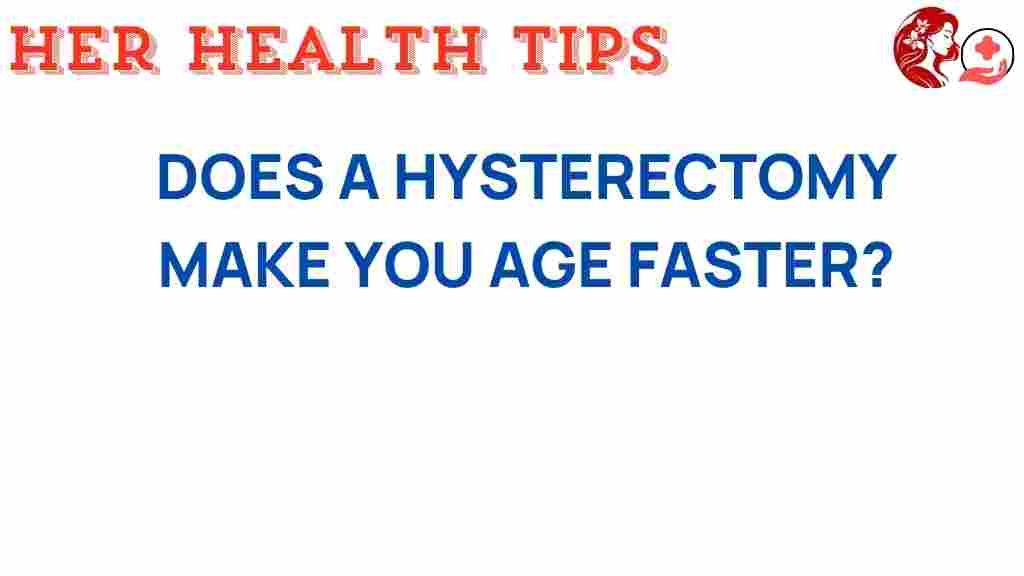Unraveling the Myths: Does a Hysterectomy Accelerate Aging?
The topic of hysterectomy and its effects on aging is one that often stirs debate among women and healthcare providers. Many women facing the prospect of this surgical procedure have concerns about how it may affect their overall health, particularly in relation to women’s health, menopause, and reproductive health. In this article, we will explore these myths and facts surrounding hysterectomy, shedding light on the process, recovery, and the hormonal changes that may occur.
Understanding Hysterectomy
A hysterectomy is a surgical procedure that involves the removal of a woman’s uterus. Depending on individual health conditions, the procedure may also include the removal of the cervix, ovaries, and fallopian tubes. This surgery is often recommended for various medical reasons, including:
- Uterine fibroids
- Endometriosis
- Uterine prolapse
- Abnormal bleeding
- Certain cancers
While the decision to undergo a hysterectomy can be daunting, understanding the implications it has for women’s health and wellness is crucial for making an informed choice.
The Aging Perspective
One prevalent myth is that a hysterectomy can accelerate the process of aging. This belief stems from the fear of losing reproductive hormones, particularly estrogen, which plays a significant role in various bodily functions. However, the reality is more nuanced.
Myths and Facts About Hysterectomy and Aging
Let’s take a closer look at some common myths associated with hysterectomy and the aging process:
Myth 1: Hysterectomy Leads to Early Menopause
Many women believe that undergoing a hysterectomy will automatically trigger early menopause. In truth, this is only the case if the ovaries are removed during the procedure. If the ovaries remain intact, natural hormone production continues, and menopause will occur at the usual age.
Myth 2: Hysterectomy Causes Rapid Aging
Some women fear that a hysterectomy will lead to rapid aging signs, such as wrinkles, weight gain, and decreased energy. While hormonal changes can have an impact on these aspects, they are not solely caused by hysterectomy. Aging is influenced by a multitude of factors including genetics, lifestyle, and overall health.
Myth 3: Hormonal Therapy is Unnecessary After Hysterectomy
Following a hysterectomy, especially if the ovaries are removed, some women may benefit from hormone replacement therapy (HRT) to mitigate symptoms related to estrogen loss. Consulting with a healthcare professional can help determine the appropriateness of HRT for individual circumstances.
Recovery After Hysterectomy
Recovery after a hysterectomy varies by individual and the type of surgery performed. Here are some key points to consider:
Initial Recovery Phase
- Hospital Stay: Most women spend 1-2 days in the hospital following the procedure.
- Rest: Adequate rest is crucial for recovery; expect to take 4-6 weeks off from normal activities.
- Follow-up Visits: Regular check-ups with your healthcare provider are essential to monitor healing.
Long-term Recovery and Wellness
Long-term recovery involves adjusting to changes in hormone levels and overall health. Here are some steps to promote wellness:
- Healthy Diet: Focus on a balanced diet rich in fruits, vegetables, lean proteins, and whole grains.
- Regular Exercise: Engage in light exercise as advised by your doctor to enhance physical recovery and mental health.
- Support Systems: Establish a support network of family and friends for emotional and practical assistance.
Hormonal Changes and Their Impact
Understanding the hormonal shifts that occur post-hysterectomy is vital for managing symptoms and overall health. Here’s what you need to know:
Estrogen and Progesterone
Estrogen and progesterone are key hormones in a woman’s body. After a hysterectomy:
- If the ovaries are preserved, estrogen and progesterone production continues as usual.
- If the ovaries are removed, the body will experience a sudden drop in these hormones, potentially leading to menopausal symptoms such as hot flashes, mood swings, and changes in libido.
Addressing Hormonal Imbalances
For women who undergo a hysterectomy and experience hormonal imbalances, several options are available:
- Hormone Replacement Therapy (HRT): This can help alleviate symptoms of estrogen deficiency.
- Non-Hormonal Treatments: Certain medications and lifestyle changes can also manage symptoms effectively.
Troubleshooting Common Concerns
It’s not uncommon for women to have concerns following a hysterectomy. Here are some troubleshooting tips to address common issues:
Persistent Symptoms
If you experience persistent symptoms such as:
- Hot flashes
- Mood changes
- Weight gain
Consider discussing these with your healthcare provider. They may recommend adjustments to your treatment plan, including HRT or lifestyle changes.
Emotional Well-being
Emotional changes can occur post-surgery. To support emotional well-being:
- Engage in supportive therapy or counseling.
- Join support groups for women who have undergone similar experiences.
- Practice stress-relief techniques such as yoga, meditation, or deep-breathing exercises.
Physical Health Maintenance
To maintain physical health after a hysterectomy, consider the following:
- Regular health screenings, including mammograms and bone density tests.
- Adopt a fitness routine tailored to your recovery needs.
- Stay hydrated and prioritize nutrition to support healing.
Conclusion
In summary, the belief that a hysterectomy accelerates aging is largely a myth. While hormonal changes post-surgery can influence various aspects of health, they do not dictate the aging process. Understanding the facts surrounding hysterectomy, recovery, and hormonal impact is essential for making informed decisions about women’s health. By addressing myths, focusing on recovery, and prioritizing overall wellness, women can navigate this significant life transition with confidence.
For more information on women’s health and wellness, visit WomensHealth.gov. If you’re considering a hysterectomy or have specific questions about your health, consult with your healthcare provider to develop a personalized plan.
This article is in the category Reproductive and created by HerHealthTips Team
